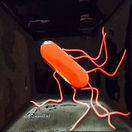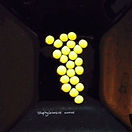Invisible Beauty Design©
Invisible Beauty Design©
Microbes figuratively, nevrotransmitter and some more art


Pseudomonas
Pseudomonas aeruginosa belongs to the Pseudomonas family. It is a Gramnegative rod with unipolar flagella’s. Pseudomonas aeruginosa is an opportunistic bacteria and part of the normal flora of the gastrointestinal tract of humans and animals. It is found in soil, water and grow in moist environments. It colonizes skin, gastrointestinal tract and airways of humans and can cause infections mostly in immunocompromised patients. Pseudomonas aeruginosa frequently cause nosocomial infections. The transmission mode is direct- and indirect contact. Disease caused by Pseudomonas aeruginosa can be treated with antibiotics.

Salmonella
The salmonellas belong to the Enterobacteriaceae family. Salmonellas are Gram negative rods. The bacteria were first isolated in 1886. The only known reservoir is healthy or infected humans. The Salmonellas are found in frozen food. Salmonellas can cause serious infections in humans like diarrhoea, sepsis and urinary tract infections. The transmission mode is through contaminated food or water. Symptoms are acute fever, affection of the mucous membrane of the GI tract. Infections can be treated with antibiotics. No vaccine is available.

Staphylococcus aureus
Staphylococcus aureus belongs to the Staphylococcus family. The bacteria are round and tend to cluster. It is found in humans as part of their normal flora on skin, in the nares, in animals and the environment. Staph. aureus was first discovered in 1881. Healthcare personnel and patients are frequently colonized with the bacteria. Transmission mode is direct- and indirect contact but also true airborne transmission. Staph.aureus can cause skin and wound infections, urinary tract infections, sepsis, meningitis and food poisoning. Although treatment with antibiotics is available, Staph.aureus showed signs early resistance towards antibiotics already in the beginning of 1960s. Today some Staph.aureus strains are multi resistant (MRSA) and this is an increasing problem world wide.
Be om mer informasjon
Be om mer informasjon